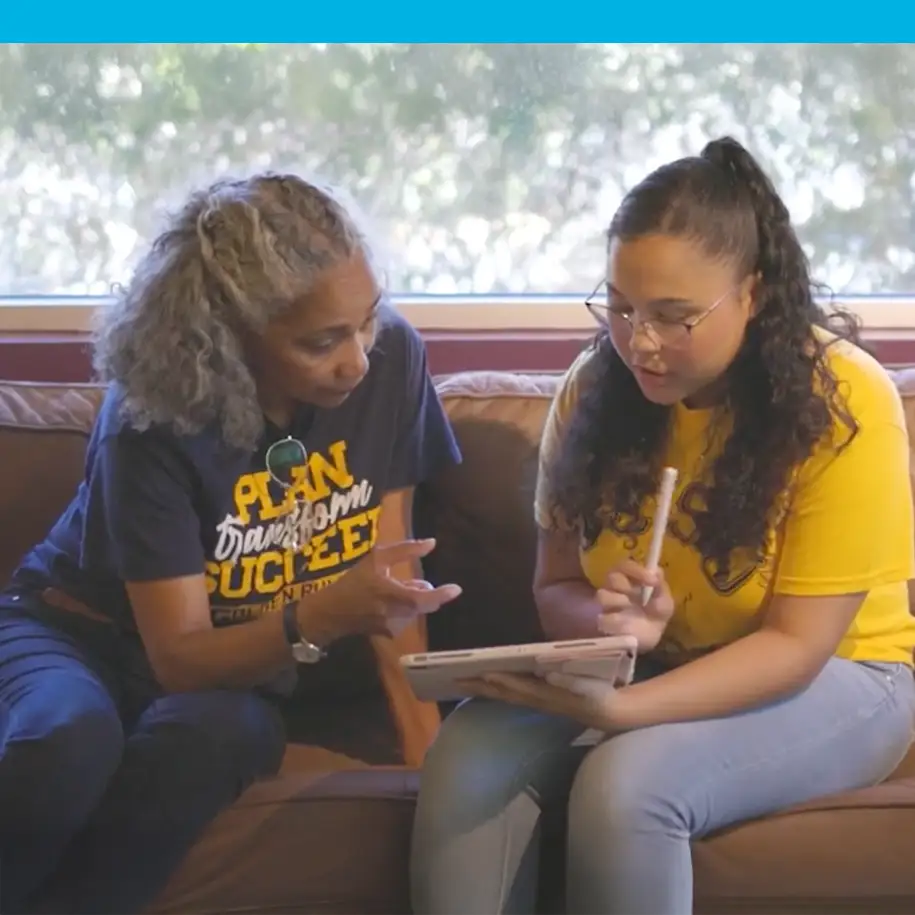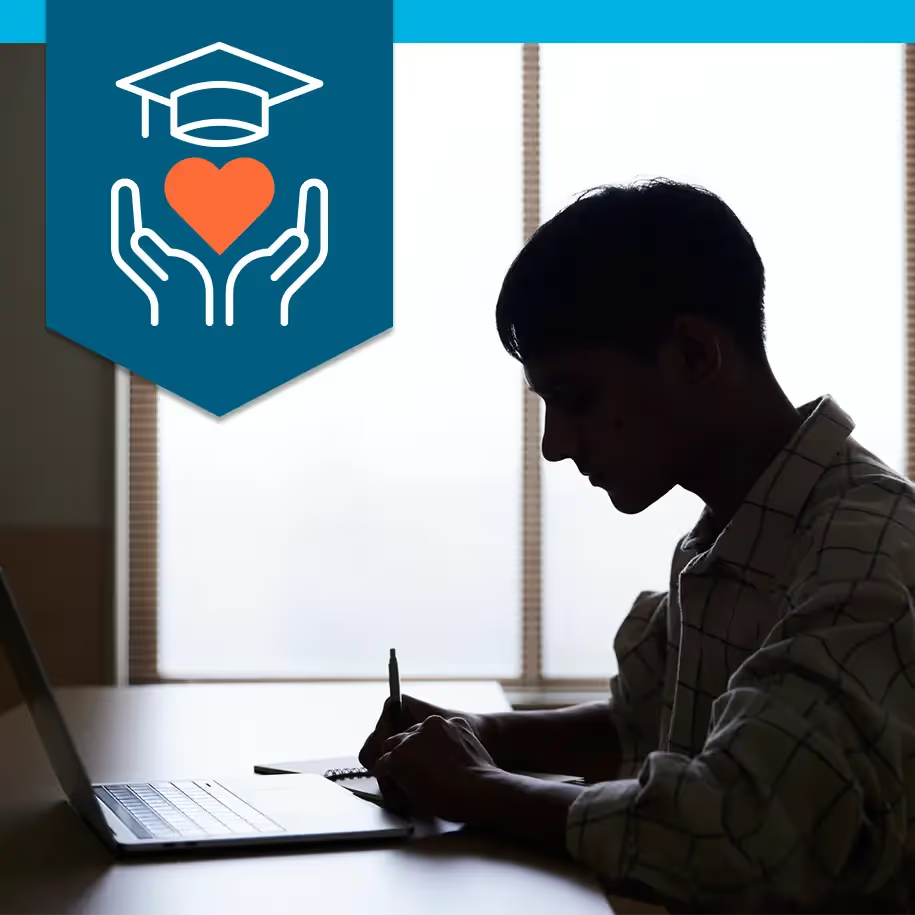
Deliver stronger student mental health support — before the breaking point
Don’t miss our on-demand webinar about improving student well-being
It’s a difficult time to be a student. Not only has the increased need for student mental health support become obvious to staff at colleges and institutions nationwide, but there’s also an abundance of data to corroborate their observations. One study found that about 70% of students have struggled with mental health since they started college. Another found that nearly one third of students (32%) currently pursuing a degree or certificate say they have considered stopping out in the past six months — and almost half (49%) of those students cite emotional stress as their primary reason. Given the impact of mental health on student success, focusing on the well-being of learners has become a critical aspect of supporting the whole student. And the earlier a struggling student can be reached, the better.
Our latest webinar, Before the Breaking Point: Proactive Strategies to Build Student Mental Health and Well-Being, brought a panel of experts together to dive into this troubling topic. Moderated by Ashley Faubion, Director of Initiatives at CAEL, the conversation features insights and tips from Seli Fakorzi (Director, Mental Health and Client Liaison, TimelyCare), Dr. Mark Patishnock (Vice President, School Programs Implementation, The Jed Foundation), and InsideTrack’s Ann Werbach (Senior Director, Programs). They bring firsthand experience with students in crisis, and they’re eager to share what they’ve learned.
Addressing the issues institutions are facing on the mental health front
Throughout the webinar, panelists outlined ways for institutions and organizations to handle some of their common pain points. One particularly pressing issue is not having enough — or the right kind — of counselors and support staff to handle the volume, range and severity of some of the mental health concerns for which students seek help. “I feel like we're hearing it everywhere right now from support staff. It's this tug and pull of, ‘I know I want to do this, but I don't have the time, the resources or the skill, potentially,'” Ann Werbach shared.
Feeling in over your head, whether it’s due to being overstretched or underprepared, is not just a support staff issue. Some professors and RAs deal with it as well. Seli Fakorzi feels for RAs and RDs “on campuses across the country who are doing everything they possibly can to stand in the gap for their peers, in essence, and make sure that they're getting to the right level of care… And I’ve had professors reach out and tell me ‘I am not in a position to have an entire conversation around grief and loss. That is not in my wheelhouse. I signed up to teach chemistry.'” Supporters at all levels, from well-meaning peers to experienced counselors, are also at risk of developing compassion fatigue and vicarious trauma. Safeguarding student mental health stands alongside the need to ensure your staff, faculty and other students aren’t being compromised in the process of providing support.
Beyond hiring more counselors, which may not be financially viable, the panelists suggest some easy-to-implement ways universities can tackle this issue. One is making sure all campus personnel know what mental health resources are available and how students can access them. “Just pointing students in the right direction is weight that we take off of our faculty and staff,” Fakorzi said. “You don't have to be the expert. But let's get the information amongst everyone, normalize that conversation, and make sure that we can all point students in the right direction.”
Creating a campus-wide culture of social connection and belonging, encouraging and destigmatizing the act of seeking help, and making sure that schools are helping students develop life skills like resiliency are also effective, immediate actions an institution can take. Werbach noted, “I just want to highlight that there are tons of tools and processes, but the power of human connection and relationships and belonging is huge for mental health. People want to belong. And as a staff member or support on campus, we have the power to make them feel like they belong. I think we sometimes underestimate the power of connection.”
“I just want to highlight that there are tons of tools and processes, but the power of human connection and relationships and belonging is huge for mental health. People want to belong. And as a staff member or support on campus, we have the power to make them feel like they belong. I think we sometimes underestimate the power of connection.” - Ann Werbach, Senior Director of Programs, InsideTrack
Partnering for next-level, specialized support
The panelists made it clear that having a strategic schoolwide plan is of critical importance. This means getting aligned on everything from making everyone on campus feel part of the mental health support efforts to “having crisis management procedures and policies in place that are actually lived and practiced and known and useful and reviewed and updated,” as Dr. Patishnock put it. This may necessitate partnering with an outside organization that can provide a more advanced level of support and all-day, everyday coverage.
Fakorzi explained, “What we've seen at Timely Care is that over 50 to 60% of our visits are happening outside of business hours, outside of the 9-to-5 time. What does that look like for students? What does it look like for faculty and staff? That's where we step in to provide them with that valuable support, to have a fully functioning crisis response team that not only deals with the crisis in the moment, but also the follow-up care… Every student does not need to be transported to a hospital for safety. But many of them do need a safety plan.”
From success coaching to our crisis support services, InsideTrack has also partnered to provide support that goes beyond what the school can provide. It’s not uncommon for a learner to present a crisis situation during a one-on-one coaching session. “If the coach is working with a learner and hears about a challenging situation or feels the learner is at risk of harming themselves or others, they bring in our crisis support team,” Werbach explained. The crisis support person’s role is to understand what the crisis is and provide the resources or referrals necessary to help the student in that moment.
Even in non-crisis times, coaching can contribute immeasurably to a student’s sense of well-being. “In our coaching, we do everything through a healing-centered approach. So we're really looking at responding with empathy, making sure that we're truly respecting the student, protecting them, and working with them to move out of their current situation,” Werbach shared. “There are multiple approaches within our coaching that really help support the mental health and general well-being of the people that we serve.”
If you missed the live event, would like to share it or just want to listen again, you have 24/7 access to the on-demand recording. Tune in to hear our panel of experts discuss:
● Proven strategies for connecting with students before they hit a crisis
● Using the power of human connection to improve mental health
● Insights into the behaviors and habits of struggling students
● Innovative ways to reach out to students who have disconnected or are reluctant to seek help
● Best practices for embedding holistic mental health support across your institution
● The importance of creating a schoolwide culture of caring — including peer and near peer support
Watch the full webinar to learn how best to reach your students and help them build connection, find out where to go for help, and access the mental health support and resources they need before they’re in crisis.
Coaching solutions proven to advance all learners
Whether you’re looking to help students persist through completion or to improve career outcomes for job seekers and employees, our holistic coaching solutions can help you achieve meaningful outcomes.



